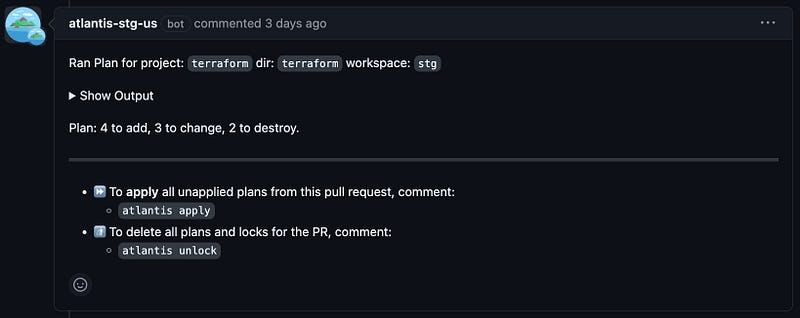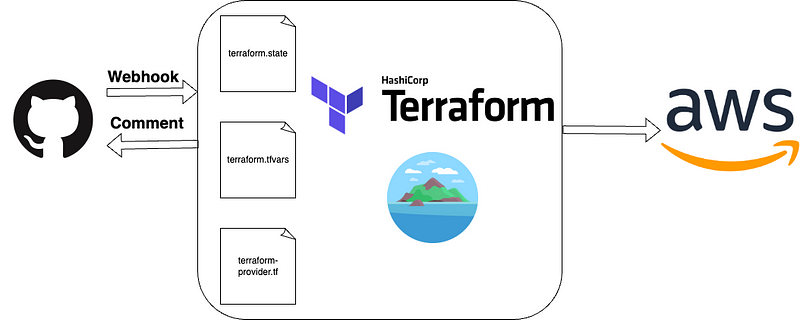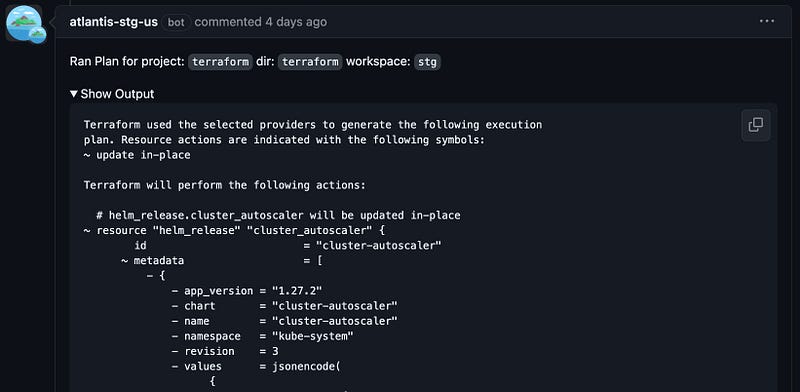In our R&D team, as developers, we keep our source code stored on GitHub or Bitbucket. When we want to make improvements to the Infrastructure , we create a pull request. Following several rounds of reviews and comments, the changes get approved. Throughout this iterative process, Terraform commands come into play, executed either on your laptop or through an Automation Workstation.
Meet Atlantis, the game-changer tool designed to automate your IaC processes.
What we will cover:
- Why would you run Atlantis? — understand what triggers us to use Atlantis.
- Configuring Atlantis on ECS Using Terraform — Learn how we did it.

Atlantis not only runs the Terraform commands but also provides feedback by commenting on the pull requests with the output. This ensures that every team member is well-informed about the impending creations or deletions and who is behind each action.
Why would you run Atlantis?
Increased visibility
When individuals run Terraform on their own computers, determining the real-time status of your infrastructure becomes challenging.
- Is the deployment from the main branch in effect?
- Did someone omit to create a pull request for the latest change?
- What output resulted from the last Terraform apply?

With Atlantis, you see everything right on the pull request, giving you a clear view of the entire history of actions taken on your infrastructure.
Promote collaborative teamwork
While sharing Terraform credentials across your engineering organization may not be ideal, the good news is that anyone can initiate a Terraform pull request.

Elevate Your Terraform Pull Request Reviews
The crucial information of the Terraform Plan\Apply is automatically included in the pull request.

Configuring Atlantis on ECS Using Terraform
On the Atlantis website, various deployment methods, such as Kubernetes Helm Chart and Kubernetes Manifest, are available. We decided to deploy Atlantis using AWS Fargate to ensure its isolation from our other infrastructure resources. Consequently, Atlantis operates serverlessly outside our Kubernetes cluster.
module "atlantis" {
source = "terraform-aws-modules/atlantis/aws"
name = "atlantis"
# ECS Container Definition
atlantis = {
environment = [
]
secrets = [
]
}
}
The sidecar Datadog container
In our approach we took the Atlantis’ Terraform module and made minor adjustments to enhance the security of our module. Additionally, since we use Datadog for infrastructure monitoring, we’ve integrated a sidecar container, to operate alongside Atlantis.
module "atlantis" {
source = "terraform-aws-modules/atlantis/aws"
name = "atlantis"
# ECS Container Definition
atlantis = {
environment = [
]
secrets = [
]
}
# ECS Service
service = {
cpu = "1024"
memory = "2048"
container_definitions = {
datadog-agent = {
name = "datadog-agent"
image = "gcr.io/datadoghq/agent:7.46.0"
memory = "400"
cpu = "400"
environment = [
{
name = "ECS_FARGATE",
value = "true"
},
{
name = "DD_API_KEY",
value = data.aws_secretsmanager_secret_version.datadog_api_key_plaintext.secret_string
},
{
name = "DD_SITE",
value = "datadoghq.com"
},
{
name = "DD_PROMETHEUS_SCRAPE_ENABLED",
value = "true"
},
{
name = "DD_PROMETHEUS_SCRAPE_SERVICE_ENDPOINTS",
value = "true"
},
{
name = "DD_TAGS",
value = "env:${var.env} region:${var.region}"
}
]
readonly_root_filesystem = false
}
}
}
}
Prometheus and OpenMetrics collection
We want to gather metrics using Prometheus Autodiscovery, therfore we include specific tags in Datadog:
- DD_PROMETHEUS_SCRAPE_ENABLED
- DD_PROMETHEUS_SCRAPE_SERVICE_ENDPOINTS
This allows the Datadog agent to detect Prometheus annotations which will be included in the Atlantis:
docker_labels = {
"com.datadoghq.ad.instances" : "[{\"openmetrics_endpoint\": \"http://%%host%%:4141/metrics\", \"namespace\": \"atlantis\", \"metrics\": [\"atlantis_builder_execution_error\", \"atlantis_builder_execution_success\", \"atlantis_builder_projects\", \"atlantis_project_plan_execution_failure\", \"atlantis_project_plan_execution_error\", \"atlantis_project_apply_execution_error\", \"atlantis_project_apply_execution_failure\"]}]",
"com.datadoghq.ad.check_names" : "[\"openmetrics\"]",
"com.datadoghq.ad.init_configs" : "[{}]"
}

Don’t expose your secrets
The deployment of Atlantis will be from our local machine, which has access to our cloud. However, our Terraform module requires access to both GitHub and Datadog. In order to address this, we have securely stored the tokens in a secret manager.
data "aws_secretsmanager_secret_version" "github_token" {
secret_id = "/github/token"
}
data "aws_secretsmanager_secret_version" "github_token_plaintext" {
secret_id = "/github/token_plaintext"
}
data "aws_secretsmanager_secret_version" "datadog_api_key_plaintext" {
secret_id = "/datadog/api_key_plaintext"
}
Setting up Webhook from you Github
To effectively respond to pull request events, Atlantis needs to receive webhooks from your GitHub.
webhook_list contains repositories that we want for Atlantis to integrate with.
resource "github_repository_webhook" "atlantis" {
count = var.create ? length(var.webhook_list) : 0
repository = var.webhook_list[count.index]
configuration {
url = "${module.atlantis.url}/events"
content_type = "application/json"
insecure_ssl = false
secret = random_password.webhook_secret.result
}
events = [
"issue_comment",
"pull_request",
"pull_request_review",
"pull_request_review_comment",
]
}
Pre Workflow Hooks
In Atlantis you can define pre-workflow hooks to execute scripts before default or custom workflows run. Pre-workflow hooks have distinct differences from custom workflows in several aspects. One of them do not require the repository configuration to be present. This can be used to dynamically generate repo configs.
In our configuration, we’ve created a server-atlantis.yaml file, which we associate during Atlantis deployment. The custom workflow logic is designed to:
- Identify the environment — from where Atlantis is operating
- Identify the branch name of the pull request
Our decision was to automatically execute a Terraform plan each time a pull request is created or a commit is pushed.
version: 3
...
...
projects:
- name: terraform
...
...
autoplan:
enabled: true
Given our setup with Atlantis per environment, we’ve chosen to run:
- Atlantis staging for pull requests named with feature/ originating from the develop branch
- Atlantis production for pull requests named with develop originating from the master branch
Explore the complete custom workflow here.
Sum it up
While establishing Atlantis on AWS ECS, we’ve not only improved our Infrastructure as Code (IaC) for a better visibility but also embraced direct feedback on pull requests, thereby promoting better collaboration within the team. The key aspect of this improvement lies in the automation process that Atlantis gives to our infrastructure.
You can find the full code of how to launch Atlatnis on ECS with our custom workflow here.
Are you looking to enhance your DevOps skills and learn how to implement continuous integration using Jenkins container pipelines? Join my course, where you’ll gain practical experience in various pipeline scenarios and master production skills. Take the first step towards becoming a DevOps expert today.
Hands-On Mastering DevOps — CI and Jenkins Container Pipelines
Questions or thoughts on your mind? Don’t hesitate to drop us a line at no-reply@top10devops.com. We’re ready to assist!